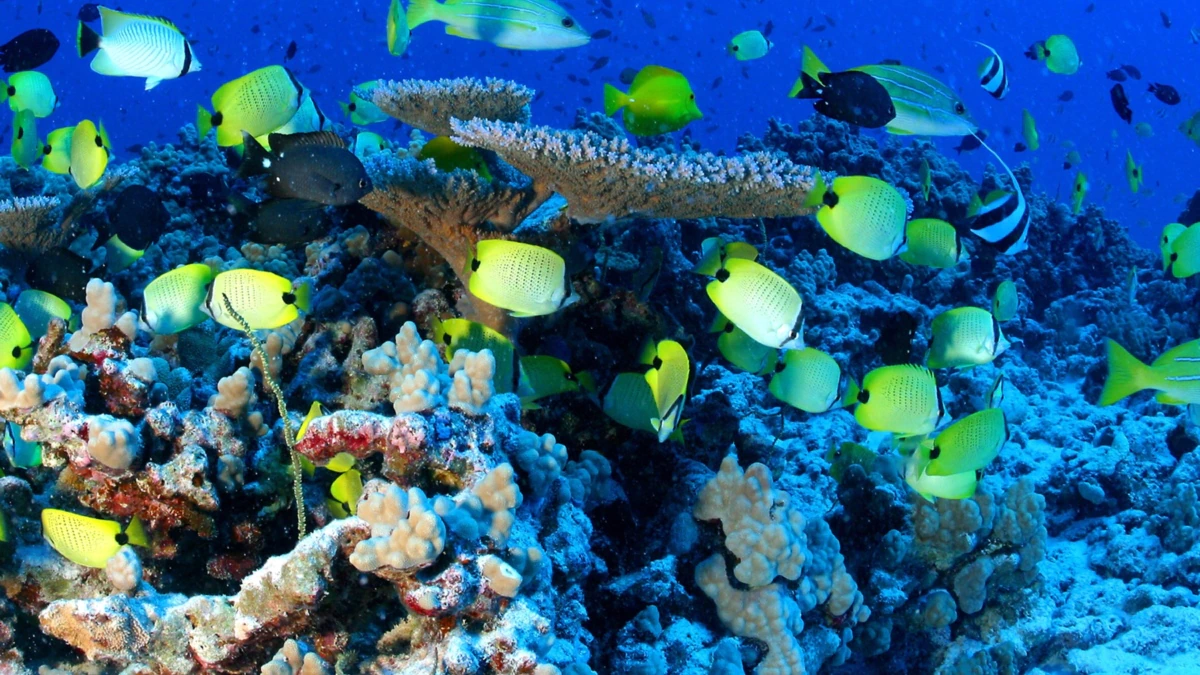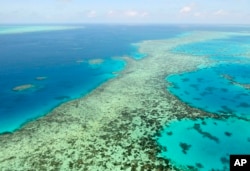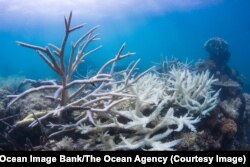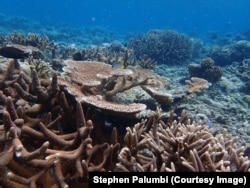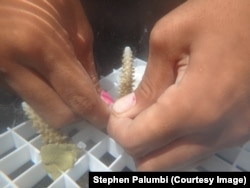“Coral reefs are amazing and beautiful, and we must conserve them,” Sam Purkis, chair of the department of marine geosciences at the University of Miami Rosenstiel School of Marine and Atmospheric Science, told VOA.
Although coral reefs only cover 0.1% of the ocean floor, they are a lifeline for the planet. With the most biodiverse marine ecosystem on earth, they contain 25% of all marine life, including more than 4,000 fish species.
Besides food, “corals provide economic, ecological and even cultural value,” where local communities living near the reefs bond over fishing activities, explained Robert Richmond, director of the Kewalo Marine Laboratory at the University of Hawaii.
“Corals also hold potential drugs from the sea, the vast majority of which we haven’t discovered yet,” Nancy Knowlton, scientist emeritus at the Smithsonian’s National Museum of Natural History, said during an interview with VOA.
However, coral experts have sounded the alarm that the reefs could disappear, threatened by a number of factors, including pollution, overfishing and especially climate change.
The latest study on the status of coral reefs, released earlier this month by the International Union for Conservation of Nature, blamed climate change for killing 14% of coral reefs in just one decade.
“Large-scale bleaching events caused by elevated sea surface temperatures are the greatest disturbance to the world’s coral reefs,” the report said.
Despite the gloomy picture, coral reef experts say there is hope, despite significant coral losses worldwide.
“We still have corals that are healthy, but it requires a massive global effort to protect them,” said Elizabeth Mcleod, leader of The Nature Conservancy’s global reef work in Arlington, Virginia.
Richmond is also optimistic.
“Although coral reefs are severely threatened, they are not doomed,” he said. If we take “aggressive action against climate change, then we will have coral reefs as a legacy for the future.”
“We’re not going to be able to restore them back to pristine condition like they were 50 years ago,” added Jennifer Koss, director of the coral reef conservation program at the National Oceanic and Atmospheric Administration. “But through restoration, and by curtailing climate change, coral ecosystems have a chance to flourish again.”
The experts agree that curbing carbon dioxide emissions that cause global warming is key.
“We need to significantly lower our emissions, so there is actually hope for coral reefs,” Madhavi Colton, executive director of the Coral Reef Alliance, in Oakland, California, told VOA.
The most striking impact of warmer ocean temperatures is bleaching, when corals turn eerily white.
“We’re seeing this drastic decline in coral cover,” said Purkis. “Unless conditions improve, many corals will die from bleaching because the organisms are weakened and usually catch a disease.”
Eliminating other stressors may help the reefs better withstand bleaching.
“If we combat stressors like overfishing and improve water quality, the reefs can better tolerate global changes and are more likely to survive and reproduce,” Colton said.
Discovering heat resistant corals may also be a game-changer.
“In the Red Sea, you find corals that have adapted and are resilient and responsive to the heat. So, these ‘super reefs’ have solved the problem, and we should figure out how they’ve done that and use them for restoration efforts,” said Stephen Palumbi, a marine biology professor at Stanford University’s Hopkins Marine Station.
Local involvement can make a difference in protecting coral reefs.
In America Samoa, the local population is working on watershed projects that help preserve coral reefs, Koss said. Rain gardens were installed on land to hold back sediment that can smother the corals.
Various methods are being used in Indonesia to safeguard the reefs.
“The locals are watching for illegal fishing, and some communities are partnering with ecotourism groups to raise awareness about the importance of the reefs,” Mcleod said.
A reef restoration program has been particularly successful in the Pacific island nation of Palau.
Citizen scientists are using readily available materials like rebar and cable ties to make frames for heat-resistant coral nurseries, Palumbi said.
“We’ve been teaching community college students through peer mentoring and on Zoom how to do these experiments and get the results on Instagram. The young people are taking steps to secure their own future.”









































